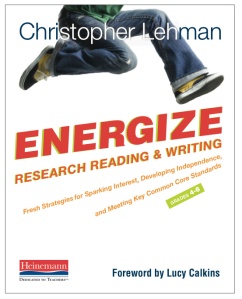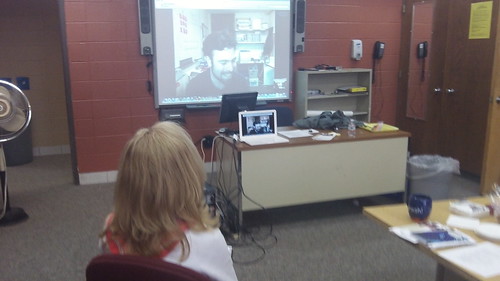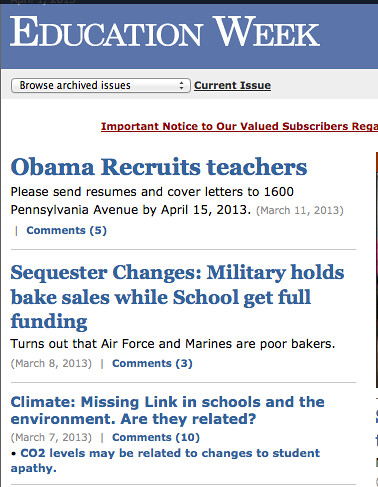Our Western Massachusetts Writing Project has been working in partnership with an urban middle school on strengthening the writing and literacy instruction. One aspect of that project is that teachers have to design and launch a classroom research/inquiry project. What we found was some confusion over what that should look like, so along with written instructions (and future one-on-one sessions),I created this short video as another way to explain what inquiry might look like.
Peace (in the sharing),
Kevin
Category Archives: WMWP
Teachers: Raising our Voices

Our Western Massachusetts Writing Project has an ongoing partnership with the local newspaper to feature teachers writing about educational issues on a monthly basis. This month, I wrote about going to a School Committee meeting and watching teachers become political advocates for learning, and for kids, and urging the rest of us to find our voices, too, when it comes to educational reform and issues.
I created a modified podcast of the article (which you can read through the link off the WMWP website).
Hackjam with WMWP
Our Western Massachusetts Writing Project is in the midst of a year-long inquiry around digital literacies. It began back in the fall with a running theme through our Best Practices conference, and has continued with a few inquiry sessions with our WMWP leadership team. The other day, I facilitated a Hackjam session, as a way to get us talking and thinking about the hacking and remixing culture of young people and how it might connect to school-based learning.
We began with an activity away from the computer. I call it Hacking the Writers, a version of Hacking the Poster that I did at the National Writing Project meeting (thanks to Chad Sansing and Andrea Zellner). I brought in a poster that I have of cartoon characters of famous writers (the poster is very funny in itself) and handed out sticky notes and said, add your own comments to the poster. The room got sort of silent, so I wasn’t sure what to expect. But soon enough, there was a lot of laughter going on and the poster got hacked.
Next, we had the privilege of having Rafi Santo skype into our meeting for about 40 minutes. Rafi has done some very interesting work around “hacking literacies” and the consideration of systems, and how to think about participatory media in a meaningful way. (We all read a piece by Rafi about hacking literacies to set the stage — you can find a link to the article here). Rafi was wonderful, helping to open up some eyes around why teachers should be considering this topic. His talk moved from social justice issues (giving power to change the media message and the issue of access) to the reclaiming of the word “hacking” as a positive endeavor to a rationale for at least understanding the technology we use on a daily basis. The topics of privacy and ownership were also featured.
My hope had been that Rafi would establish a case for why we should care, and use, hacking literacy ideas in the classroom, and he did so in a meaningful way.
Next, I introduced two tools: one was the Lego Gender Remixer, which allows you to remix Lego commercials in order to uncover marketing techniques. The other was the Hackauraus XRay Goggles, which is a hacking tool that allows you to hack websites (not really — it is an overlay) and craft new messages. We went into Education Week and hacked our own messages about teaching, and you should have heard the giggling and chatting that was going on in the room. There was excitement about some easy tools that would help students and teachers understand the larger concepts.
These kinds of sessions help lay the groundwork for consideration of our classroom. I don’t expect hacking to suddenly explode in their schools. But getting situated on the possibilities, and flipping the concept to a positive idea around empowerment of student voice, is a step in the right direction.
Peace (in the hack),
Kevin
Slice of Life: The WMWP Hackjam
This for Slice of Life. I’ll share out more of what we did in the Hackjam tomorrow.
Western Mass Writing Project Hackjam rocked! #slice2013 #6words Podcast: soundcloud.com/dogtrax/slice-…
— KevinHodgson (@dogtrax) March 12, 2013
Peace (in the hack),
Kevin
Program or Be Programmed: Quotes from Douglas Rushkoff
This afternoon, I am facilitating a session with the Western Massachusetts Writing Project around hacking literacies. It’s part of our year-long inquiry around digital literacies. I’ll share out some of the work (playful work) we will be involved with, and the sites we are using, tomorrow. But I created this slideshow of quotes from Douglas Rushkoff’s book, Program or Be Programmed, as a teaser for the start of the session. (The book is great, by the way, and I highly recommend it).
Peace (in the code),
Kevin
The Virtual PD Visit: Christopher Lehman
I am helping to co-facilitate a professional development class this spring (it began in December, actually) around writing and literacy and the Common Core with an area elementary school. Our work is being funded through a generous grant by the National Writing Project, and administered through my Western Massachusetts Writing Project. We have a great group of teachers who are diving into literacy and will soon begin an Inquiry Project that will move us forward into the end of the school year.
The other day, we spent our Saturday in professional development activities. (There are three of us co-facilitators from WMWP helping to guide the sessions). My role was introducing research components to the teachers, and to get us thinking about ways that research might not only inform learning, but what it might look like in the classroom. Our main text was Chris Lehman‘s fantastic book — Energizing Research Reading and Writing (which I highly recommend) — and each teacher has their own copy of the book, which sparked some interesting discussions about how research projects look now, and how they could look as we consider the Common Core.

On a whim a few weeks back, I asked Chris if he might be available to Skype into our session, and discuss what he discovered as he wrote the book and to answer questions from the participants after they had read his book. He agreed, and his virtual visit was a huge hit. Not only is Chris a passionate professional development leader, and a talented writer and researcher himself, but he connected with this audience of teachers in a struggling urban school and he really inspired them to look closely at their own teaching practice. We covered a lot of ground in our short Skype visit, from narrowing down topics, to finding and using sources, to the role of audience in the writing.
My other motive was to begin to show the teachers how the technology they have in their building might open up some more avenues for learning for them and their students. A few of them asked me about Skype in the Classroom — wondering how to invite authors into their classrooms. As we begin to use Edmodo for sharing about Inquiry Projects, they are considering if the site works for their students as writers. Our aim is to embed learning and technology in the PD in a meaningful way, and make it useful and viable for classroom instruction as well as teacher learning.
The visit with Chris was a good example of that: it not only brought some more expertise into the room that day, expanding our work around research and writing, it also demonstrated the power of technology to make connections, with relatively little fuss or set-up. And I deeply appreciated that Chris gave up his time on a Saturday to share some of his understanding with our teachers. They appreciated it, too.
Peace (in the visiting),
Kevin
NCTE Podcast: Celebrating Teacher Voices

I had the pleasure of talking with Steve Zemelman and Harry Ross, of the Teachers Speak Up initiative, about the Western Massachusetts Writing Project’s partnership with our local regional newspaper. WMWP celebrates teachers as writers, and the partnership with the newspaper has opened up a regular educational column in which teachers write about their views on education and classroom experiences and strategies in a positive light.
The podcasts, which are hosted by NCTE, explore the rationale behind the partnership, as we as gives some practical advice for teachers who are seeking ways to get their views of the educational landscape (and debates) into the public sphere. I hope you have time to give it a listen, and add your own voice into the mix.
Peace (in the voice of teachers),
Kevin
Keynote Video: Digital Kids, Digital Literacies
I finally got around to editing and uploading some footage from a keynote address to the Western Massachusetts Writing Project on the topic of digital literacies. I cut the presentation down as far as I could, but it is still sort of long (20 minutes). I hope it helps you frame some ideas around legitimizing the digital literacies of our students.
and this is the file with the keynote presentation slides:
Peace (in the prez),
Kevin
An Inquiry into Technology, Student Voice and Social Justice
I’ve written about this a few times, but our inquiry theme this year the Western Massachusetts Writing Project is digital literacies. A keynote address that I gave the other week at a WMWP event centered on valuing the emerging literacies of the digital age.
And yesterday, as a follow up to that keynote, I helped facilitate an inquiry session with about a dozen WMWP folks around the idea of valuing student voices. In particular, much of our discussion and exploration centered around the ways that podcasting and audio recording can open up doors for expression for students.
We began with a writing prompt, on which we wrote about one of those “aha! moments” around technology — that time when something happened that you suddenly realized some possibilities. We then used Audacity to share out some of our moments. We didn’t save the audio file, however, since it was an experiment in the session and I was working on the school’s computer. But here is a podcast version of what I wrote about, centering on a student with learning disabilities who discovered some tools that helped re-envision himself as a writer.
We then spent some time on the National Writing Project’s Digital Is website, considering the rationale and reasons why technology can have an impact on learning, and empowering students. In particularly, we read and watched the videos related to this fantastic resource by some friends in California: The Change Writers. What we really loved is how the resource shows a project that merges the power of digital media and production with writing and research, in a meaningful way. That resource also connected last year’s of WMWP around social justice with this year’s digital literacy theme.
Check out one of the videos from the resource that really shows the value of podcasting and Voicethread for student voice and motivation and audience:
Finally, we used Voicethread, too, and we began with a short writing prompt, asking the folks what kind of change they would bring to the world. I’ve kept the thread open, if you want add your ideas, too. Please, do.
And for a final reflection, we used Wallwisher to add a final thought to the inquiry session. I was happy to be part of this group, diving into the possibilities of digital literacies and tools, and keeping our focus on student learning as writers and as producers of content.
Peace (in the inquiry),
Kevin
The Influence of the Western Massachusetts Writing Project
At our annual conference last weekend with the Western Massachusetts Writing Project, we asked teachers to reflect on what impact the WMWP has had on their professional and personal lives. Here are some of the responses, which demonstrate the power of being connected to a strong network of teachers and colleagues who value not only writing, but also all aspects of teaching, and who reach out to support and encourage others in the WMWP network.
Peace (in the project),
Kevin


